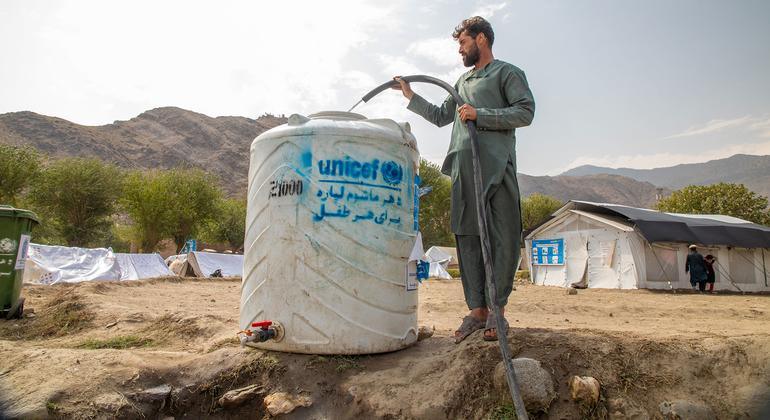The serious outbreak risk comes after a 6.3 magnitude earthquake struck a remote region of eastern Afghanistan on August 31, near the Pakistan border, destroying water, sanitation and hygiene infrastructure.
“The earthquake razed homes and caused too many deaths, and now threatens to cause even more deaths from disease.“, warned Dr Tajudeen Oyewale, UNICEF representative in Afghanistan.
He said child survivors of the earthquake are living in overcrowded displacement camps or makeshift shelters, without access to toilets or clean water.
“It’s a perfect storm for a health disaster“, he added.
A major cause of death
Acute watery diarrhea is one of three types of wasting illnesses, according to the World Health Organization (WHO). This may last several hours or days.
The disease is the third leading cause of death among children aged 1 to 59 months and kills more than 400,000 children under the age of five each year.
The WHO says that to a large extent, clinical diarrhea is preventable with clean water and adequate sanitation and hygiene – basic necessities currently lacking among Afghan children.
No access to drinking water or soap
UNICEF reports that in Afghanistan, 132 water sources were destroyed due to the earthquake, leaving families without access to clean water or hand-washing facilities.
Four out of five communities now practice open defecation, with most latrines destroyed in the earthquake. Many survivors also lack access to essential hygiene items like soap, creating conditions ripe for an outbreak.
Acute watery diarrhea is prevalent in the region and communities are also at risk of other waterborne diseases. Health centers are also reporting an alarming increase in various types of rashes and dehydration, according to UNICEF.
Underfunded emergency response
UNICEF provides WASH (water, sanitation and hygiene) services in more than 60 countries, helping to prevent infections and diseases in homes, schools, health facilities and public spaces.
The agency installed temporary sanitation facilities in earthquake-affected areas, distributed hygiene kits, and deployed temporary emergency water trucks while simultaneously repairing water supply systems.
However, only half of UNICEF’s $21.6 million appeal for its emergency response has been secured. Agency calls on donors to urgently increase funding.
The World Food Program also faces a funding gap of $622 million over the next six months. The agency’s operations in Afghanistan are one of six operations at risk, alongside those in the Democratic Republic of Congo (DRC), Haiti, Somalia, South Sudan and Sudan. WFP assistance in the country now reaches less than 10 percent of the millions of food-insecure Afghans in need..
A young girl washes her face at a camp for people displaced by the earthquake in Kunar province, Afghanistan.




